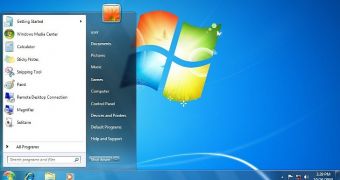With so many people still running Windows XP even though this OS version will be retired in only 20 days, all eyes are on the newer operating systems that could benefit from the retirement on the ancient platform scheduled to take place on April 8.
Of course, Microsoft hopes to see a mass transition to Windows 8.1, but companies providing migration services for Windows XP users are claiming that Windows 7 continues to be the number one destination for the majority of clients.
Value Licensing, a company that sell second-hand Windows 7 licenses obtained from bankrupt or liquidated firms, told The Register that Windows 8.1 is still a product that customers avoid due to the changes Microsoft made to the user interface.
Windows 7 license sales grew up by 11 percent in the second quarter of 2013, 38 percent in the third and 66 percent in the fourth, according to stats published by the sources, and a 20 percent increase is also expected to be recorded this year.
“The [Windows 8.1] interface is alien to them. They are more keen to get Windows 7,” Jonathan Horley, Value Licensing's managing director, was quoted as saying.
That’s exactly the kind of issue that Microsoft is trying to tackle in future Windows updates, with Windows 8.1 Update 1, the first major package of improvements coming next month, also said to make the desktop a bit more helpful for those still sticking to a traditional desktop computer.
Windows 8.1 Update 1 will come with options to pin Metro apps to the taskbar and thus launch them without the need for accessing the Start screen, which means that Microsoft is working to give its controversial Modern user interface a new chance to succeed.
The Start screen, in its turn, will also be improved with power options and a search box, which again would provide enhanced usability on a desktop computer, as users would be allowed to perform specific actions, such as shutting down their computers, with fewer clicks.
A link to the original Control Panel will also be included in the Metro Settings screen, while Metro apps will have a dedicated title bar with buttons for closing and minimizing, just like traditional desktop applications, again in a move supported to make the entire operating system a bit more appropriate for the traditional mouse and keyboard configuration that’s still the main input method on the well-known PC.

 14 DAY TRIAL //
14 DAY TRIAL //